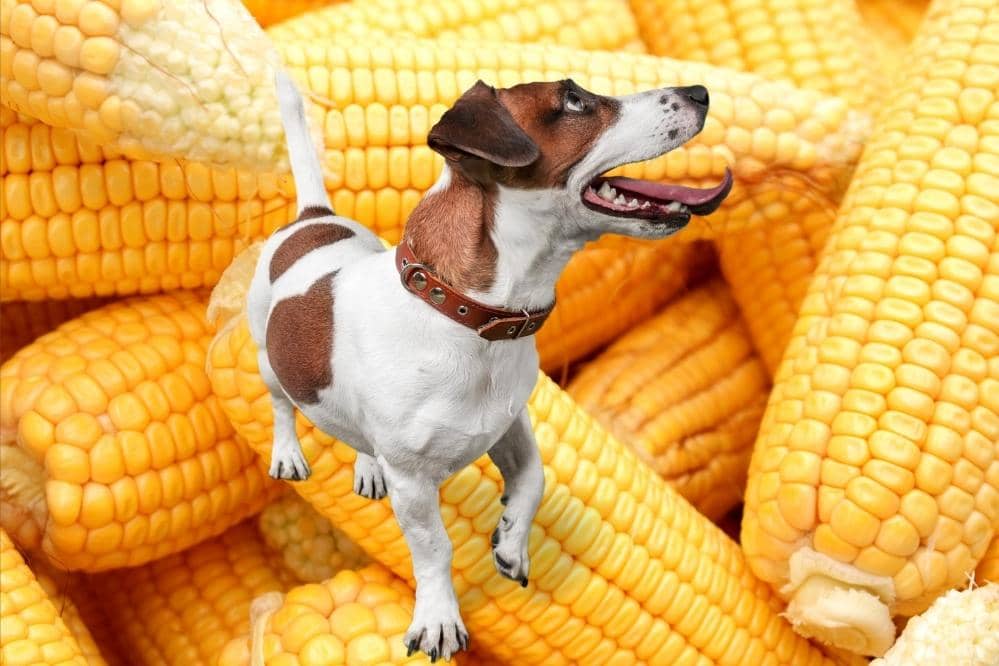Corn starch is one food ingredient that most dog owners have never agreed on whether it’s good for dogs to eat.
Some corners say corn starch contains no nutritional value to a dog. While others, mostly dog food manufacturers, disagree since it is a great binding agent in dog food. Moreover, this ingredient increases the calorie content in any food. And neither is wrong.
So can dogs eat corn starch?
And what’s likely to happen if a dog overeats cornstarch?
Continue reading to learn whether corn starch offers any nutritional value to your dog.
What is corn starch?
Corn starch is a starch made from the endosperm of corn. These endosperms are ground to form a smooth and fine powder. Corn starch is best used as a thickener to hold dry food together.
Many dog food brands use this carbohydrate to add bulk to dog food, ensuring it lasts longer.
Is Cornstarch Bad For Dogs?
Corn starch can be good or bad for your dog, depending on the form.
Corn starch right from being ground is not suitable for dogs. Although non-toxic, pure cornstarch might trigger tummy issues like flatulence, gassiness, vomiting, and diarrhea. When inhaled, your dog is bound to have respiratory irritation, which might present through sneezing and coughing.
Worth noting, corn starch is bad for dogs with diabetes. Cornstarch is a high glycemic ingredient that might trigger high sugar levels in your dog’s bloodstream.
Corn starch is also not appropriate for senior dogs who are inactive. That is because corn starch is full of useless calories that might cause excess weight gain. And as you know excess weight gain will shorten dog’s quantity of life.
However, corn starch, mostly found in dog treats and biscuits, is not bad for dogs.
Nevertheless, if your dog has any underlying issues, consult the vet before feeding it cornstarch. The vet will advise whether this food ingredient might aggravate your dog’s underlying conditions.
Do Dogs Like Corn Starch?
Dogs prefer corn starch when incorporated into dog biscuits and treats. When used in treats, corn starch acts as a binding agent.
Dogs also like cornstarch mixed in their dog food, more so in raw dog food. Corn starch improves the texture when mixed with raw food, encouraging your dog to chew food.
However, moderation is crucial. One tablespoon per 20 pounds of body weight is enough and won’t trigger any adverse health issues.
If your dog seems to have an excess liking of corn starch while disliking other ingredients, watch out, he might be having pica.
You might need to take your dog to the vet to check whether it has a vitamin deficiency
Benefits of Corn Starch for Dogs
Corn starch’s nutritional value is not that high. As you know, it’s rich in carbohydrates, a nutrient less desirable for most canines.
Below is the nutrient content of 100gms of cornstarch.
| ENERGY | 375 kcal |
| PROTEIN | O gm |
| FAT | O gm |
| CARBOHYDRATE | 87.5 gm |
| FIBER | O gm |
| FATTY ACIDS | O gm |
Nevertheless, here are some benefits of cornstarch for dogs
1. An Excellent Option for Dogs with Gluten Allergy
Some dogs react to gluten. The good thing is that such dogs can consume corn starch with no negative aftermath since this food ingredient is gluten-free.
Moreover, corn starch rarely triggers allergy issues in dogs since it lacks proteins, unlike corn flour.
2. Corn Starch Has High Calories And Is Best For Dogs Who Want To Add Weight
Skinny dogs who need to bulk up will have a noticeable change after eating cornstarch.
3. Corn Starch Is Also A Great Alternative For Dog Shampoo.
When used as a shampoo, corn starch clears any sebum that might clog the dog’s pores on the skin. You can mix cornstarch with baking soda for a deodorizing effect. You can also mix cornstarch with eucalyptus essential oil to make a dry shampoo to deter fleas.
4. Corn Starch Also Helps Soothe Inflamed Skin.
5. Corn Starch Is A Great Alternative To Styptic Powder To Stop Any Bleeding.
Corn starch is a handy ingredient when clipping the dog’s nails. If you accidentally nick the quick and don’t have styptic powder, you can turn to this inexpensive ingredient to stop excess bleeding.
6. Tummy Issues.
Although not as effective, corn starch can help soothe a disturbed tummy, more so for dogs who are having diarrhea. This cornstarch absorbs any excess fluids in the dog’s gut.
What Is The Best Way To Give A Dog Corn Starch?
The best way to give a dog corn starch is by mixing it with dog food or making treats.
You can mix one tablespoon of cornstarch in your dog’s regular food. You can also add cornstarch to your dog’s bone broth to make it more slurry and boost the calorie content.
Alternatively, you can use cornstarch to make yummy treats. Corn starch is a suitable option for those dogs allergic to corn flour or when you want to add variety.
What Happens When A Dog Eats Too Much Cornstarch?
Can dogs eat corn starch? Yes, however, in moderation. Too much corn starch can cause adverse tummy effects.
Here are the adverse symptoms of a dog that has overeaten corn starch;
- Flatulence
- Loose or watery stool
- Vomiting
- Constipation
You might also see other physical signs when you feed your dog too much corn starch—for example, sneezing, watery eyes, runny nose, and coughing.
Any time you see your dog with such symptoms, don’t wait. Contact the veterinarian asap.
Is Corn Flour The Same As Corn Starch?
Corn flour and cornstarch are often confused. Although they are all sourced from corn, they differ in texture, taste, and uses.
First, corn flour is obtained by grinding the whole corn kernels. In contrast, corn starch is obtained by grinding the corn’s endosperm.
Corn flour is best used for baking, while cornstarch is best used as a binding agent to prevent food from clumping.
Conclusion: Can Dogs Eat Corn Starch?
Corn starch is a non-toxic but less nutritious food ingredient; you might have seen people giving it to their dogs.
It will cause no harm if given to your dog once in a while, when included in dog treats. If your dog seems to react to it, reduce it or withdraw it altogether. There are other alternatives that your dog can chow down happily with no adverse effects.

